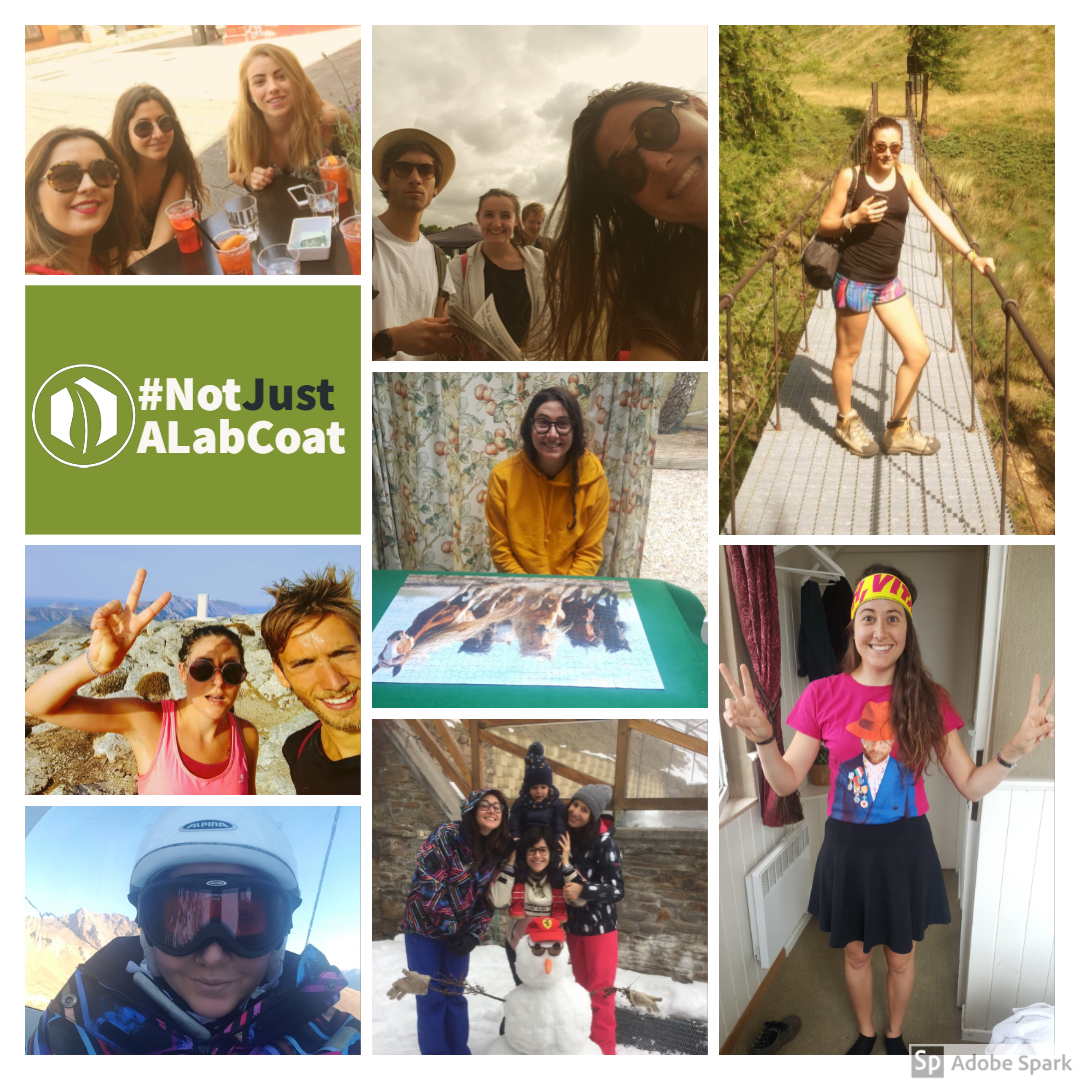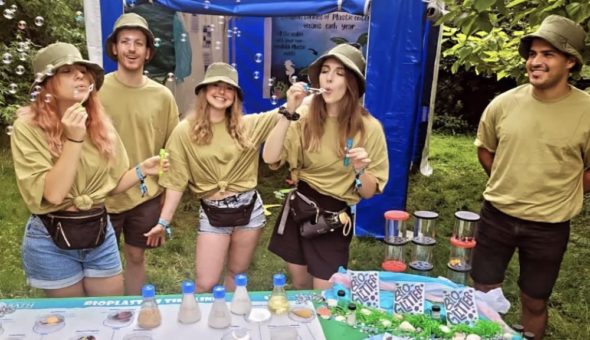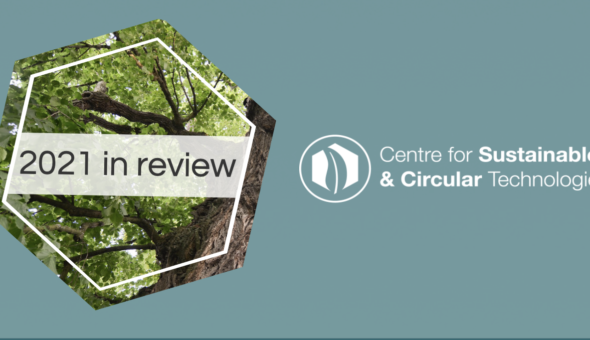Meet Dr Isabella Poli, one of the rising stars in sustainability research who very recently finished her PhD at the CSCT. During her time at the CSCT, Isabella published four first-author papers in peer-reviewed journals and was a finalist in the Italian Women Inventors and Innovators prize 2017.
This year, Isabella was also the winner of the Ede & Ravenscroft prize, awarded on behalf of the Senate to a postgraduate student for high standards of achievement. Following this latest success, we interviewed Isabella to find out more about what makes her tick both in and outside of her professional career.
Starting with your professional motivations… Why sustainable chemical technologies, and why the CSCT?
I studied an MSc in Sustainable Energy Technology in the Delft University of Technology, the Netherlands, with specialisation in photovoltaic solar energy. Since I really enjoyed research, I wanted to pursue my studies in sustainability, more specifically in the solar energy sector.
I wanted to study in the UK because its universities are known to be the top universities in Europe and world-wide, and because for years I had been so fascinated by the British culture (and British accents!). So when I came across the CSCT option in Bath during my PhD hunt, I thought – sustainability + English university? BINGO.
What attracted you to solar energy research in particular?
During my bachelor’s degree in the Politecnico di Milano, Italy, I had an amazing opportunity to spend a year of study in Shanghai, China. I took complete advantage of my one-year student visa to travel around China and its rural areas, visiting traditional villages and towns. For the first time in my life I came across entire villages disconnected from the national grid. In such remote rural areas, off-grid solar products play an important role in addressing energy poverty. This amazing experience encouraged me to pursue studies in sustainability and renewable energy sources.
Can you tell us more about your research at the CSCT?
My research looks at new semiconductor materials that can harvest sunlight and convert it into electricity. The compounds I am investigating, called perovskites, have attracted huge attention in the past decade as potential new solar cell materials because of their low cost and easy manufacturing process.
Conventional solar cells are made of silicon, and their manufacturing requires expensive and very specific equipment. The processes involved require temperatures above 1000 degrees Celsius, so making these solar cells is also highly energy intensive. In contrast, perovskites can be processed using cheaper equipment, using a liquid solution at temperatures as low as 100 degrees Celsius.
Solar cells made with perovskite compounds have nowadays reached conversion efficiencies as high as silicon. However, their durability and lifetime is still relatively short, which has prevented them from becoming a viable alternative to silicon solar cells. One of the factors that affect the durability of perovskite solar cells is moisture. Water molecules easily penetrate the solar cell, causing the chemical and crystalline structure of perovskites to fall apart.
During my PhD research I investigated different strategies to improve the ability of perovskite solar cells to resist the degrading effects of moisture and humidity
It was mentioned by your research group that your recently published research in Nature was the result of a ‘crazy idea’. Can you tell us this story?
As mentioned, perovskite solar cells are highly sensitive to moisture. When ‘unprotected’ perovskite devices are left in ambient air with relative humidity higher than 40%, they slowly degrade. Just for reference, the average annual relative humidity in London is around 80%, so you can imagine the effect in these solar cells.
My idea was to use perovskite-based devices to harvest sunlight while entirely dipped in water. This of course sounded absurd, but also highly challenging! With my groups, we managed to design a cheap and sustainable protection strategy that waterproofed perovskite solar cells and allowed them to perfectly work even when completely submerged in water.
What have you found challenging along the way?
I think that one of the most challenging aspects of doing a PhD is dealing with failures. In the world of research, failures occur more often than successes. One of the first things I was told when I started my PhD was that no results are meaningless - even ‘negative results’ that are far from what you initially expected are valuable. And while this is very true, the dream would be to not have to deal with feelings of failure at all! When we fail, it’s very easy to take things personally and lose confidence and motivation. What really helped me throughout these hard times was acknowledging the achievements I got instead, and seeking positive feedback.
As often pointed out, you can learn much more from failures than from successes. Most of the time failures are just catalysts for positive changes in the long term!
To future PhDs I would say - when you are experiencing a bad time, try to look at the positive side of being a PhD student. You are immersed in such a diverse and inspiring environment that gives you the opportunity of constantly learning and stretching yourself by trying out new things. For example, during my PhD I improved my coding and writing skills. I’m sure I would never have had this opportunity if I hadn’t been in a university environment.
The best tip you have received as a PhD student?
It is very easy to get completely immersed in your research while doing a PhD. I got my best piece of advice from a wise old friend: while doing your PhD don’t forget that families and friends need you, and that you need them too. On top of this I would add: don’t forget to exercise! Even just a walk around the campus can help to release the pressure and put things back into perspective.
Who inspires you?
It might sound like a cliche, but the person that inspired me the most throughout my entire life is my mum. She is no doubt the most dedicated, brave, confident and determined person I have ever met; and she gave me the constant strength to go beyond my limits.
Professionally speaking, I feel so lucky to work with Petra Cameron, as she is such an amazing and supportive supervisor. I really enjoyed doing research with her and feel like I am a different person to the one that joined her group years ago. I think differently and I do things differently thanks to her. She saw the potential in me and this counts more than anything else.
What about the ‘PhD life’ took you by surprise?
I was not expecting to feel at home easily or to find good friends in Bath, but since the first day I started with the CSCT I felt really welcomed. During Induction Week and the first year as a CSCT student you have to spend a lot of time with your cohort, in activities that you wouldn’t necessarily choose as extra-research activities. Still, I loved every single one of these, and I am happy to call all my cohort-mates friends thanks to this time spent together.
What happens after the CSCT?
I really enjoy doing research, so I have recently started doing a postdoc with Dr Annamaria Petrozza at the Centre for Nanoscience and Technology, Italian Institute of Technology, Milan. And I'm still working on perovskite solar cells!
Going forward, I would like to pursue an academic career – I’m not sure I will make it as it’s not easy, but what I am sure about is that I will stay in my beloved Italy for a little bit!
The best memories of your PhD?
- The feeling of confidence after a paper has been accepted
- Working in the lab when nobody else is there – turning up the music and singing loudly while making solar cells is absolutely priceless!
- Leftover biscuits, fruits and sandwiches in the pool area of the department - always nice to get a free snack to fuel your lab-work day…
What do you enjoy doing when you’re not PhDing?
I can proudly say I spend most of my spare time… running! I love running. I am currently training to run my first full marathon. Actually, the Marathon in Athens (wish me luck!).
During my time in Bath I discovered the joy of tennis and now I love watching and playing tennis (or maybe I should say hitting the ball and not the net?). Special thanks for my new tennis hobby to Caitlin Taylor, fellow CSCT student who introduced me to Wimbledon and the British art of queuing to get Wimbledon tickets.
I come from the North of Italy so I love hiking (who wouldn’t with such majestic mountains?). I’ll just say that England, particularly the South, is not famous for its great mountains… But I translated my mountains hiking hobby into coastal path trekking, so not too bad!
I also love gossiping over drinks - generally Campari Spritz if in Italy or beer if in England - with friends and sisters; skiing with my dad even when he’s really harsh with me; doing puzzles or knitting on rainy days (so rewarding); going to gigs even if on my own (I can’t play any instruments and when I see live bands I am so easily impressed and happy); and doing any of the sports listed above with my boyfriend (I feel so lucky to share all these hobbies with him!).
Any fun facts about Isabella?
Even though I have lived in the UK for the past 4 years, I have never given up my traditional Pizza Sunday. Sunday is not a Sunday without a pizza. Pineapple, BBQ sauce, sweetcorn, chicken and garlic sauce are all banned from my Pizza Sunday. Yes - I get pretty defensive about Italian food culture…
Also, I’m afraid of birds. Pigeons, ducks (having lunch by the campus lake is always a battle for me… and most times the ducks win), chickens, seagulls, swans, sparrows… If you can fly you are my enemy.
Respond



